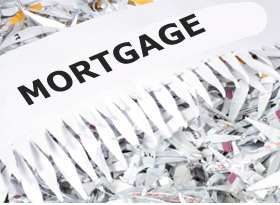
Mortgage Papers
What is a mortgage?
A mortgage is a loan to finance the purchase of a home. Since few people pay cash for a house, a mortgage serves as a way to enable the home buyer to make the purchase by way of a mortgage agreement. The mortgage, and the mortgage papers it consists of, represents the entire means by which a loan creates a lien on real property. Once a mortgage is signed, the agreement gives the borrower access to the money, and the lender is granted the right to take possession of the mortgaged property if the borrower does not make the loan payments.
Mortgage Documents
It is likely the largest debt that a consumer will acquire in a lifetime, and involves several key points to consider: collateral to secure the loan, principal and interest payments, taxes and insurance. Generally, when a buyer takes out a loan to purchase a home, he is required to sign two basic mortgage documents: a promissory note, and a mortgage (or deed of trust). The promissory note is basically an IOU that contains the promise to repay the loan. The mortgage, or deed of trust, is the document that pledges the property as security for the loan and permits the lender to foreclose if the borrower fails to pay the monthly installments.
Where should I store mortgage papers?
There are two things to consider when storing important mortgage papers: keeping the papers close at hand in case you need to quickly access them, and keeping them safe and secure from theft, fire and other incidental loss. Consider the following safekeeping solutions:
- Home Safe (one with a good fire rating)
- Safe Deposit Box (not considered a good choice for quick retrieval)
- Fireproof Filing Cabinets (2 drawer or 4 drawer)
Water damage is another possible threat to the security of your important mortgage papers. When storing papers, take extra precaution to protect against water damage from floods and other disasters by storing papers above ground in plastic bags or containers.
What mortgage papers should I shred?
If you've ever refinanced or owned a home, you probably have a stack of paper documents in your
filing cabinet.
 When you're selling your house, you will need to access these records. But after you've sold your house, how
long do you need to keep the records that pertain to your old property?
When you're selling your house, you will need to access these records. But after you've sold your house, how
long do you need to keep the records that pertain to your old property?
Destroying important documents that are no longer needed is a good practice for everyone, as it helps to avoid identity theft. When it comes to effectively destroying documents and paper files that relate to your home, there are different lengths of time in which you should keep them before you send them to the paper shredder. Among investment-type documents that require you to keep safe are papers that serve as proof of ownership, such as deeds for real estate and other mortgage papers. A will is another record that requires safekeeping, as it may contain information on the house and household items. As far as documents that have expiration periods and documents that represent something that has been sold, they should be stored in a safe place until they are no longer needed, then properly shredded. Don't let them pile up, go through them once a year and properly shred papers that are no longer needed.
Insurance policies - Generally, keep insurance policies that you renew each year, such as those for your home, apartment and condo until you get new policies, then shred the old ones.
Paper Records for Household Items - Keep receipts, agreements and warranties for the major appliances and electronics that are in your home. You can get rid of a warranty when the period it covers has passed, and the rest of the material when you sell or no longer own the item. The same goes for canceled receipts and bills for purchases such as furniture.
Keeping the warranties and receipts for appliances longer than their expiration period might be a good idea if they are covered in the homeowner's insurance plan. If they are lost due to theft or destroyed by a natural disaster, the warranty will serve as proof that the appliances actually existed and the homeowner will be eligible for reimbursement.
Home Improvements - Keep records of home improvements for the duration of the home ownership period plus 3 years.
Monthly Financial Statements - Discard monthly mortgage statements after one year as long as the new statement indicates the cumulative activity for the entire year. As far as cancelled checks, since most banks no longer return them, keep the pages that include either a copy of the check or a line item that represents the check transaction. This will provide proof of the payment.
Loan Documents - Keep the closing documents for a mortgage and other loans in a safe and secure place. When the loan is paid off, keep them for 3 years and then shred them.
Tax Returns - The statute of limitations is 3 years after your taxes were filed or due, usually whichever was last. However, additional years can be added if there was a significant mistake or fraud involved. Keeping personal federal and state tax returns and related supporting records for longer than the statute of limitations would be a good idea, so keep them for about 7 years, and then shred them.
* You can easily scan the returns into your computer and store them on a CD or external hard drive to reduce the amount of paperwork.
Form 2119 - If you owned a home a sold it before 1998, keep Form 2119 until you've sold the replacement home. Form 2119 was used to report the sale of an old home and any purchase of a new one within the replacement period. You would have filed Form 2119 with your tax return the year you sold your old home. Keep a copy of Form 2110 with your tax records for the year of the sale. Keep an additional copy with your records for the basis of your new home.
Utility Bills - Generally, you can shred your house utility bills after the next bill is due and paid. Otherwise, you may need to keep them if you need them for tax deduction purposes. You may also need to hang on to them if you are a renter and need proof that you are a legal tenant.
What mortgage papers should I keep for a lifetime?
First, as long as you actively own the real estate in question, it is recommended that you keep all records associated with the home. It is useful to keep these records separate from your yearly tax records for easy reference.
Experts have different views regarding how long to keep documents such as your promissory note, security instrument, HUD statements and other mortgage and refinancing closing documents. The minimum time to hold on to these documents is at least three years after the transactions are completed. You might even want to hold on to them for about ten years. It is not uncommon for some to hold on to them for a lifetime, as you never know when you might need these documents. So consider hanging onto your mortgage and refinance documents permanently.
Capital Gains - Be sure to keep any documentation that can be used in calculating capital gains. A capital gain is a profit that results from the sale of an asset that amounts to more than the original purchase cost. All home improvements, additions or modifications made on your house, as well as expenses selling it are added to the original purchase price or cost basis. The difference between sale price and original price (cost basis) is the capital gain. Keeping records of these items can help lower the capital gains tax.
Estate Planning Documents - Keep copies of wills, trusts, and powers of attorney forever. You should also make sure your attorney and your executor have accurate copies. It's also a good idea to give copies to anyone named to make decisions on your behalf.
*A mortgage is recorded in the county land records, however, the promissory note is not. The lender holds the promissory note while the note is outstanding and is returned to the borrower when the loan is fully paid off.
First Time Buyers
If you are a first time buyer, then understanding what a mortgage is and what paperwork is involved in the agreement is essential to becoming a responsible homeowner. Knowing what documents to save, where to save them, and what documents to shred after a period of time will prevent hassles with the IRS, problems with organization, and identity theft.

